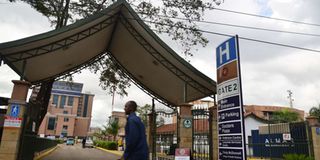Nairobi Hospital’s leadership row deepens as shareholder wins round one of case

The Nairobi Hospital.
What you need to know:
- Dr Frank Mwongera is querying changes made by the board on an AGM notice just three days to the virtual meeting.
- Dr Mwongera also took issue with the voting and tallying of votes and declaration of results to members through the virtual system.
- The defendants include the hospital’s Board of Management, its chairman and the CEO.
Leadership wrangles and control of Nairobi Hospital are far from over after a shareholder received a court’s nod to challenge a board decision to amend a notice for a virtual Special General Meeting three days to the conference.
Dr Frank Mwongera moved to court on behalf of members of the Kenya Hospital Association, which owns the premier health facility, querying the changes on the notice three days to the virtual meeting held on July 30.
At the heart of the legal battle is amendment of the Hospital’s memorandum and Articles of Association. The first notice dated July 3 proposed a resolution that the hospital’s “Board of Management to run the affairs of the health facility in collaboration with the Medical Advisory Committee as elected by the Admitting Staff Association.”
Mandatory collaboration
But a second notice dated July 27 amended the previous to read “Board of Management to run the affairs of the health facility in mandatory collaboration with the Medical Advisory Committee as elected by the Admitting Staff Association.”
Justice Francis Tuiyott found that the difference in the words used in the two communications point to a possible difference in substance and meaning.
While allowing Dr Mwongera’s suit, Justice Tuiyott declined the hospital’s argument that there was no change in the substance of the proposed amendments that were conveyed to members in the notice of July 27.
Another argument that the judge declined was that the Board of Management had no obligation to furnish the details of the proposed amendments to members prior to the meeting.
The hospital had submitted that it shared the information in a show of responsibility and transparency.
But the court held that if the business of the meeting involves amendments on the Memorandum and Articles of the Company, an outline of the proposed amendments needs to be shared with members in advance to enable them reflect meaningfully on their effect.
“To merely notify members that an intended meeting will be discussing amendments to the Memorandum and Articles without setting out the nature of the proposed amendments, even in general terms, will not help members prepare for the meeting,” Justice Tuiyott said.
Not an act of grace
To provide sufficient information to members, the judge stated, is to act in congruence with the tenets of good governance and not an act of grace as suggested by the defendants in the case.
The defendants include the hospital’s Board of Management, its chairman and the CEO.
“Even if I be wrong in my finding, I hold that, where like here, the board decides to provide detailed information to its members, that information must be a true mirror of what is to be discussed at the general meeting. It must not mislead,” the court said.
Sending out information to members just three days before the meeting could be viewed as an act in bad faith, the judge said.
Dr Mwongera also took issue with the voting and tallying of votes and declaration of results to members through the virtual system.





